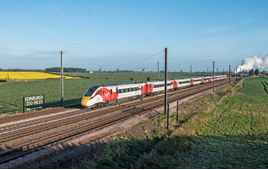Over the Christmas period, the national media was keen to highlight research showing that the UK’s train fleet in 2015-16 was the oldest in many years, with an average age of 21.0 years. It was less inclined to point out that this will soon drop to 16.0 years.
Prior to June 8’s General Election, 5,665 vehicles were either on order or formed part of ongoing orders. And the majority of these new trains are not necessarily designed to replace existing trains entirely, but rather to boost capacity for certain train operating companies (TOCs) and to release vehicles for use elsewhere. On June 20, First MTR confirmed a deal for 750 vehicles for its new franchise.
Not every replaced vehicle will have a new home, but it would be incorrect to suggest that all the new orders are merely like-for-like replacements.
Clichéd comments about new trains being predominantly for the South were made by Ed Cox, Director IPPR North. Yet TransPennine Express currently operates the youngest UK train fleet, and it is set to take delivery of three brand new train fleets - replacing all of its Class 350/4 electric multiple units (EMUs) and most of the Class 185 diesel multiple units (DMUs). Northern has 281 new vehicles on order, while Virgin Trains East Coast (VTEC) will be serving the North with its Class 800/801 Intercity Express Programme trains.
Some of the new trains form part of relatively small orders, some were ordered speculatively before finding homes, while others form part of an entire TOC fleet replacement plan.
Billions of pounds are being spent on the new kit by various organisations, with more expected to follow as more franchises are let, usually with new trains. And money is cheap at the moment, which means new vehicles are financially more viable than perhaps they would have been in a different financial climate.
One such example is Great Western Railway’s AT300 Class 802 bi-mode order. Funded by Eversholt Rail Group, 36 trains (14 nine-car and 22 five-car) are currently being constructed and delivered to the UK (RAIL 828, 829).
They are intended to replace GWR’s High Speed Trains (HSTs), the oldest of which are now more than 40 years old. However, that had not always been the plan - indeed, GWR did consider refurbishing the HSTs to take them past their half-century anniversary.
In the end, such a move proved to be not commercially viable when the cost of converting HST vehicles to meet disability access regulations required for use beyond January 1 2020, combined with the likely required refurbishments and overhauls, was compared with the cost of new trains.
Put simply, the HST would last probably around a further ten years, whereas the AT300s will have a likely lifespan of at least 30 years. Thus, the value was in the new £500 million fleet.
As well as the 6,415 vehicles either on order or being delivered as part of ongoing orders, a further 17 four-car EMUs are due to be ordered for c2c as part of the Essex Thameside franchise. Meanwhile, the new South Western franchise won by FirstGroup includes a planned 750 vehicles for inner-suburban routes.
Many deals in place also have options for more trains if required, so the figures could yet change. And with the continued rise in passenger numbers, you would not bet against some orders being extended.
All of the trains currently on order will be in traffic by the end of 2020, as the industry looks to accommodate not only the 1.7 billion passengers that it moves annually, but also the expected further growth in passenger numbers.
Some fleets have already started to enter traffic, such as GWR’s Class 387/1s and Govia Thameslink Railway’s Class 700s, as the deals placed earlier start to bear fruit.
From September, Hitachi Rail Europe will start delivering Class 385s into traffic for ScotRail. These will initially operate on the Edinburgh-Glasgow via Falkirk High route (provided the overhead line electrification programme is completed on time), before spreading to other routes.
In October, the first Intercity Express Programme Class 800/0s will enter traffic with GWR, as the industry finally witnesses the start of the HST replacement. Crossrail’s Class 345 Aventra EMUs are also due to enter traffic imminently, as will South West Trains’ Class 707s, although no date has been confirmed for either the ‘345s’ or the ‘707s’.
















Login to comment
Comments
No comments have been made yet.